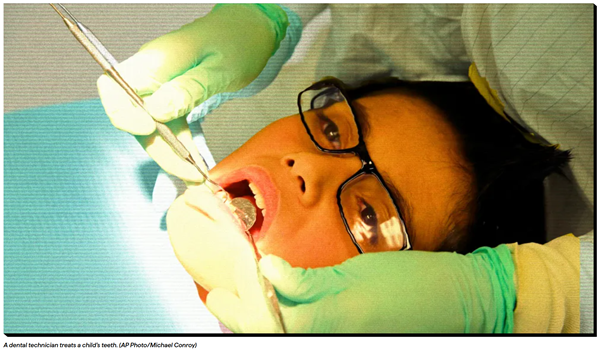Private Equity Wants Your Teeth
By Helen Santoro
July 22, 2025

As private equity reshapes American health care, the dentistry industry is now leading the charge — and patients are bearing the cost. In the last decade, private equity firms have been quietly taking control of dental care from behind the scenes, largely through secondary business organizations that push dental practices to cut costs and, in some cases, encourage unnecessary and irreversible dental procedures.
In 2024, the dental industry witnessed 161 private equity deals — the highest number of any health care industry, as tracked by the watchdog organization, Private Equity Stakeholder Project. The data reveals that these investment firms are increasingly acquiring dental practices or inserting themselves into clinic management roles, where they then cut corners on patient care.
“A lot of small dental practices have been bought up by big corporations,” said Adelena Brannan, a dental hygienist in Virginia who has been working for 12 years at private practices, where she’s heard about the harmful effects of acquisition. As these large corporations have begun buying up small, independent practices, patients increasingly face overcharging, understaffing, and, in worst-case scenarios, excessive dental treatments that destroy otherwise healthy teeth.
Brannan describes the industry consolidation, along with its focus on cost reduction and speed over quality of care, as “McDonald’s for teeth.”
According to research published last year, the proportion of dentists affiliated with private equity has nearly doubled from 2015 to 2021, reaching almost 13 percent of all practitioners. This consolidation reflects a broader trend: For years, private equity firms have been acquiring thousands of health care businesses worth hundreds of billions of dollars, a move that’s often linked to worse health outcomes — like, for example, at private equity-backed hospitals or nursing homes, where patients are more likely to fall or contract infections.
Private equity firms usually aim to generate large profits over a short period of time by buying a business, cutting costs through measures like layoffs, and eventually selling it to other investors or sending the business into bankruptcy. Critics warn that this opaque, predatory financial industry is pillaging a wide range of American industries from health care and retirement funds to craft stores and Minor League Baseball, leaving economic devastation in its wake.
Notably, private equity has been encroaching on the dentistry field through a growing number of dental service organizations — outside companies that handle the business side of dental practices, such as administrative management, bookkeeping, and marketing services. These organizations, which are ostensibly isolated from clinical work, commonly employ cost-cutting tactics that are harmful to patients, like overbooking and understaffing, to increase profits.
Circumventing The Rules
The dental industry is an especially alluring target for private equity firms because it’s comprised of thousands of independent clinics, offering investors a fragmented industry to consolidate and streamline. Between 2011 and 2019, private equity firms bought up $4.4 billion worth of dental practices.
Top health care subsectors with private equity deals, 2024. (Credit: Private Equity Stakeholder Project)
Most states have regulations in place that seek to ensure medical decisions, including those in dentistry, are made based on patient care, not financial interests. But in the six states without these regulations, including Arizona, Mississippi, North Dakota, New Mexico, Ohio, and Utah, private equity firms can purchase dentistry offices outright.
In the majority of states where licensed dentists must legally own their own practices, investors use dental service organizations to acquire clinics — and circumvent state regulations. These organizations, which were first established in 1975 but began gaining traction in the mid-1990s, only handle business and management operations, leaving dentists responsible for all clinical decisions.
This separation supposedly “creates a firewall between profit-driven decision making and clinical practices,” said Eileen O’Grady, director of programs at the Private Equity Stakeholder Project. But it isn’t always easy to fully delineate between the management side of a dental practice and the clinical operations. “Part of the fear is that when private equity firms own [dental service organizations], they exert undue influence over dental decision-making… with an eye to increase profitability and productivity.”
According to a joint 2013 investigation into dental service organizations by the U.S. Senate Finance and Judiciary committees, this fear is warranted. The congressional investigation found that even 12 years ago, these organizations created a system that “places profits before patient care.” Specifically, they showed a “failure to meet quality and compliance standards, including unnecessary treatment on children; improper administration of anesthesia; providing care without proper consent; and overcharging the Medicaid program.”
An example of such abuse comes from the dental service organization…
[READ THE COMPLETE ARTICLE HERE]
